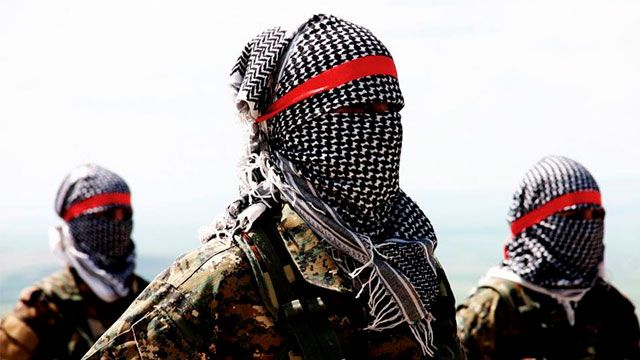Another Looming Crisis in the Middle East: Amin Saikal

Iraqi Kurds' referendum for independence carries the potential to embroil the region in another devastating conflict, says Professor Amin Saikal. Image of Kurdish fighters: Flickr
As the crisis emerging from the so-called Islamic State (IS) is subsiding to some extent, another crisis is looming to bedevil Iraq and the region. It emanates from the Iraqi Kurds' referendum for independence, which was held over the last weekend. It carries the potential to embroil the region in another devastating conflict, should the Iraqi Kurdish leadership persist with implementing the resounding results of the referendum.
The Kurds form one of the largest ethnic groups in the Middle East. They are primarily spread over four countries. They make up over 8, 6, 14 and 2 million of the 37, 83, 72 and 35 million populations of Iraq, Iran, Turkey and Syria respectively. They are mostly Sunni Muslim, with a burning historical desire to have an independent state of their own. In the wake of the First World War, the British promised them statehood, but that promise was reneged for geopolitical reasons. Ever since, the Kurds have nurtured separatist movements in varying degrees from time to time in the four countries, only to be suppressed by the central governments of those states. Their struggle for independence has been nowhere more pronounced than in Iraq and Turkey. In Iraq, until its overthrow by the 2003 US-led invasion, the Saddam Hussein regime kept a very tight lid on the country's Kurdish population. He even used chemical weapons in 1988 to subordinate them. In Turkey, a leftist Kurdish group, the Kurdish Workers Party (PKK), has fought for an independent Kurdish state for some four decades, but has been countered by Ankara at the cost of thousands of lives.
Meanwhile, the only country where the Kurds have succeeded in building an autonomous status has been in Iraq following the US invasion. This has materialised in the wake of America's post-invasion mismanagement of Iraq and the Kurds' close cooperation with the United States in support of the latter's invasion and subsequent fight against IS. Over the last 14 years since the invasion, the Kurds have succeeded in building a strong regional government and a well-trained and well-equipped militia, Peshmerga, with almost total control over their traditional homeland in northern Iraq. The territory in their grip also contains a number of oil fields, from which they have profited for economic and social development, security enhancement, and widening trade ties and political contacts with the outside world. Their position has lately been further cemented with the support given to Peshmerga by the United States and its allies in countering IS, and Peshmerga's successes in the battlefield.
However, this does not mean that the Iraqi Kurds are totally united. They are divided along rival tribal and political lines, with their two main parties being the Kurdish Democratic Party (KDP) and the Patriotic Union of Kurdistan (PUK). Whereas the PUK has been more cooperative with the central government and its leader Jalal Talabani served as Iraq's president from 2005 to 2014 under the new Iraqi federative constitution, the KDP, led by Masoud Barzani, who has been the president of the Iraqi Kurdistan region since 2005, has proved to be more persistent in its demand for independence. As IS's territorial control has diminished and Peshmerga has gained further strength, Barzani has found it opportune to hold a referendum for independence, including in such multi-ethnic and multi-sectarian cities as the oil-rich Kirkuk.
However, not only the Iraqi government, but also all of Iraq's neighbours have remained totally opposed to the creation of an independent Kurdistan and have threatened to stop it, if necessary by force. The United States and its Western allies have also cautioned against such a development, despite the fact that without their favourable disposition towards the Iraqi Kurds, the latter would not have been able to reach this point to bid for independence. The fear is that in addition to the dismemberment of Iraq, which is already deeply fractured along sectarian and ethnic lines, an independent Kurdistan would become a source of nourishment for Kurdish separatist movements in the neighbouring states.
The only world leader that has publicly declared his full support for an independent Iraqi Kurdistan is the Israeli leader, Benjamin Netanyahu, whose government has nurtured good relations with the Kurdish regional government and whose Mossad intelligence service has secured a strong presence there. In this, Netanyahu has pursued the traditional Israeli objective to make sure that the regional conditions are never ripe for a united Arab or Islamic front to emerge against Israel: the more the region is in turmoil, the better for Israel in maintaining its security and occupation of the Palestinian lands. At the same time, the Israeli leader's declaration of support could also be poisonous for the Kurdish cause, given the strong regional apprehension of Israel.
Whatever the future developments, the Kurdish referendum has now set in motion a set of national and regional concerns that could easily result in another bloody conflict in Iraq, involving the country's neighbours. An avoidance of such a development requires the Kurds to rescind the results of their referendum, and to negotiate with the Baghdad government to maintain their current autonomous status, which is quite extensive. But Barzani has said that the Kurds will be willing to fight to their last drop of blood to implement the result of the referendum. Nothing less than the future stability of the regional order is at stake.
Amin Saikal is distinguished professor of Political Science and Director of the ANU Centre for Arab and Islamic Studies (the Middle East and Central Asia).